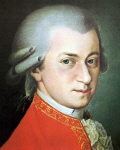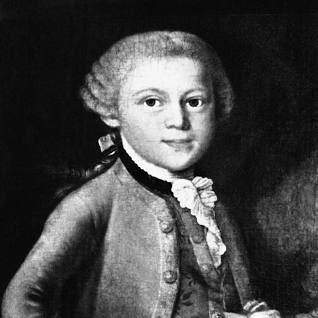

Wolfgang Amadeus Mozart
Born: 1756Died: 1791
Education: Mozart's father not only taught him music, but assumed responsibility for all of his education including languages and academic subjects.
Career: Mozart was proficient on the harpsichord, clavichord, pianoforte, organ, violin and viola. At the age of 14, Mozart became concertmaster at the court of the Archbishop of Salzburg.
Austrian composer. Son of the violinist and composer Leopold Mozart (1719–87), he was born the year of the publication of Leopold’s best-selling treatise on violin playing. He and his older sister, Maria Anna (1751–1829), were prodigies; at age five he began to compose and gave his first public performance. From 1763 Leopold toured throughout Europe with his children, showing off the “miracle that God allowed to be born in Salzburg.” The first round of touring (1763–69) took them as far as France and England, where Wolfgang met Johann Christian Bach and wrote his first symphonies (1764). Tours of Italy followed (1769–73); there he first saw the string quartets of Joseph Haydn and wrote his own first Italian opera. In 1775–77 he composed his violin concertos and his first piano sonatas. His mother died in 1778. He returned to Salzburg as cathedral organist and in 1781 wrote his opera seria Idomeneo. Chafing under the archbishop’s rule, he was released from his position in 1781; he moved in with his friends the Weber family and began his independent career in Vienna. He married Constanze Weber, gave piano lessons, and wrote The Abduction from the Seraglio (1782) and many of his great piano concertos. The later 1780s were the height of his success, with the string quartets dedicated to Haydn (who called Mozart the greatest living composer), the three great operas on Lorenzo Da Ponte’s librettos—The Marriage of Figaro (1786), Don Giovanni (1787), and Così fan tutte (1790)—and his superb late symphonies. In his last year he composed the opera The Magic Flute and his great Requiem (left unfinished). Despite his success, he always lacked money (possibly because of gambling debts and a fondness for fine clothes) and had to borrow heavily from friends. His death at age 35 may have resulted from a number of illnesses; among those that have been suggested are miliary fever, rheumatic fever, and Schönlein-Henoch syndrome. No other composer left such an extraordinary legacy in so short a lifetime.

